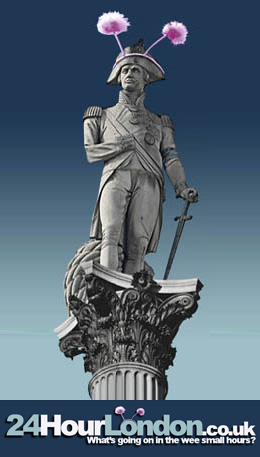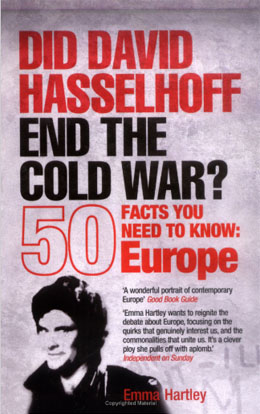If you recall, the reason why the folk awards was exempt from the Freedom of Information Act, the BBC said, was because obligations under it vanish if the thing under scrutiny can be defined as art, journalism or literature. So the folk awards qualified as either art, journalism or literature. The BBC was a little hazy about which.
On the other hand, there was nothing much that was hazy about the eight page letter from the Information Commissioner, which was full of legal twists and turns: lots of people have challenged the way the FoI Act works in the last five years. But what it boiled down to to in the end was that the law defines the BBC Radio Two Folk Awards as - drum roll - journalism.
Specifically...
... the "second limb of the definition" being journalism.
Just think about that for a moment.
John Leonard's stated reasons for "employing judges anonymously" were that (1) they might get free CDs and (2) too many musicians would try and get in touch with the 150 or so judges (for what else is "lobbying" in the context of the folk awards but playing someone your music? There are no large record companies to offer financial inducements or lavish freebies, whatever Leonard might like to suggest) and that this would place undue pressure on them.
Both of these reasons are ultimately about concealing information. Firstly the names of the judges are concealed so that, secondly, music will be concealed from the judges.
I ask you: what does this have in common with journalism? However hostile one might feel to individual journalists or media outlets, journalism in a democratic society is not about concealment. It is about the opposite.
Something is very wrong here, for the BBC and the Information Commissioner to have arrived at a point where they are defending the concealment of information on the grounds of journalism.
I refer you to the concept of doublethink from George Orwell's novel 1984.
Sorry. Couldn't resist that :-) Some points.
(1) This state of affairs may be partly due to a confusion between journalism and the relatively new concept of "content", which is something else entirely.
(2) Other people will ask the same question of the BBC and the Information Commissioner in the future - in precisely the same way that I have not been the first to take it to them myself. (And thank you, by the way, to the person - let's call you Marjory - who got in touch to say that they'd already trodden this path, and accurately predicted the outcome so far. There may have been others - the data protection act prevents us from knowing.) Anyone reading this blog can pursue the matter in the same way I have and I know that some have considered it. This is because the BBC Radio Two Folk Awards is produced using public money and we have a right to know how it is spent. This money, incidentally, goes into the pockets of John Leonard and all employed by UBC Media Group, lest we forget. Our money.
(3) UBC Media Group is listed on the stock market and check out the correlation between the stories running about the company on this blog and the drop in share price on this graph. Is that a coincidence? It's unlikely, since the story was picked up by Roy Greenslade, whose media column in The Guardian is read by analysts. It's lost more than 20 per cent of its share price since the beginning of December.
(5) Unless the process of judging the folk awards ceremony is seen to be honest John Leonard, the BBC, Sony, Uncle Tom Cobbly and all might as well give away the awards within their gift to the musicians, agents and PR people who've made them most tempting offer. Because we don't currently know any different.
And yet despite all this, the Information Commissioner has left a chink of light. I asked why the folk awards are different, as far as the BBC was concerned, to the their Sports Personality of the Year award, which not only publishes the provenance of the judges but for whom they voted. And this was the Information Commissioner's reply
* If you'd like to read this saga from the beginning you could start here.
* Here is the next post about the BBC folk awards.
* If you'd like to receive posts form this blog directly into your Facebook news feed, you can do so by *liking* its Facebook page.






The daftest thing is, when I 1st saw the nominations I just thought "boring, same old same old, I'll just remember last years show and save myself the time of watching it again"
ReplyDeleteThen someone asked who judges. I was interested, thinking it may be too narrow a pool and hence why it's the same old, same old
At that point I had no thoughts of conspiracy.
However the more and more this gets drawn out, the more and more I think "what are they hiding?"
This isnt AREA51! You have no secrets best kept in the national interest hidden here!
Emma, your considered and intelligent approach is inspiring.
ReplyDeleteI'm with you all the way on this one.
Ken Nicol.
What you are describing, Emma, seems to be daily buisiness, and sometimes I think: Trying to fight against it is like trying to catch the wind. But people like you are encouraging me - you remind me that it is worth getting aware of those things and making them public.
ReplyDeleteConny and Ken, thank you. That means a lot x
ReplyDeleteWe live in a pluralistic democracy and one of the jewels in its crown, that distinguishes it from repressive and illegal regimes, is the open exchange of information in the public interest.
ReplyDeleteHowever, a shrill minority sometimes like to point out small imperfections in the system, the complexity of which has evolved honestly and certainly not as a pretext to obscure hidden levers of influence.
It is therefore understandable if Joe and Jane Public may occasionally find that their busy taxpaying existences do not permit them to arrive at a satisfying explanation of how the institutions really are working in the public interest. In short, they may need to turn to an expert, for whom no matter, even a minority-taste annual music award, is too trivial.
A guy who is 'a specialist in using the Freedom of Information (FOI) Act' and has both campaigning zeal and expertise blogs here: http://www.bbc.co.uk/news/correspondents/martinrosenbaum/
That should sort things nicely, don't you think?
Strokey beard Mark, I've tweeted Martin. If you could contact him too, it might encourage him to get in touch.
ReplyDelete